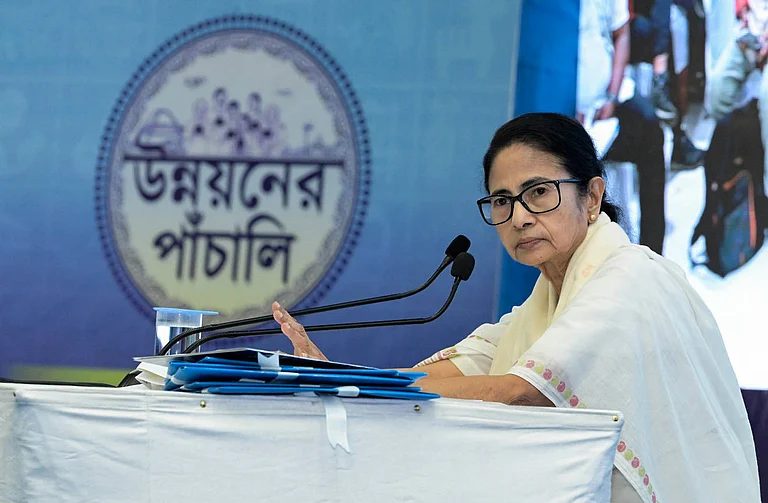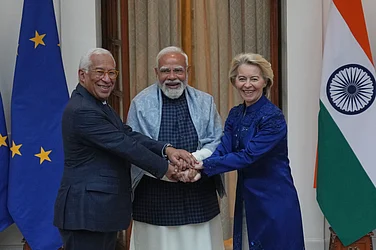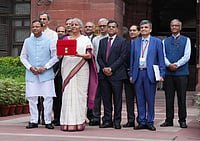Finance Minister Nirmala Sitharaman in her budget speech outlined, “The trinity of demography (youth, poor, women and farmer) democracy and diversity backed by ‘Sabka Prayas’ has the potential to fulfil aspirations of every Indian.” However, this does not reflect in terms of budgetary commitment towards the development of minorities, and particularly the youth.
In case of the education of minorities, a huge unspent balance has been reported in the scholarship programmes for Financial Year 2022-23. Utilisation stood at 3.1 per cent, 5.6 per cent, 9.6 per cent and 31.6 per cent in the Pre Matric, Post Matric, Merit Cum Means and free coaching schemes, respectively. The first three scholarship schemes of the MoMA are implemented through the National Scholarship Portal (NSP). However, there is an inherent issue in the structure of the implementation of these schemes as disbursement of the scholarships starts only in the last quarter of the fiscal year and goes on until the end of the first quarter of the subsequent financial year. The process of payment gets delayed due to the late opening of the window for registration of applications by the NSP, and verification of applications at the institution, District and State levels.
As highlighted by the Departmentally Related Standing Committee on Social Justice – 2023-24, the scholarship schemes face several implementation issues with poor utilisation of funds, inadequate coverage of beneficiaries due to the quota system, low unit costs due to inadequate allocations of funds, and also scrapping of some of the schemes. The funding given to students as scholarships is not adequate to meet their educational expenses. The unit cost for scholarships in Pre-Matric, Post-Matric and Merit-cum-Means schemes for minorities has not been revised since the inception of the schemes, that is since 2007-08.
A perusal of the website of the Ministry of Minority Affairs (MoMA) indicates that the financial resource allocation benefiting minorities has not been completely and timely reported under the schemes run by select general ministries and departments under the 15 Point Programme for the last 10 years. Further, the revised guidelines of renamed or new central schemes over the last ten years lack specific provisions for minorities. Therefore, disaggregated data on minorities with regard to their share in public sector employment, credit facilities and development outcomes by line Ministries and departments has not been reported under the 15 Point Programme.
Currently, MoMA is one of the main sources of financing for the development needs of minorities. There is a marginal increase in the budget estimate (BE) for 2024-25 to Rs 3183.24 crore from Rs 3097.60 crore in the BE of 2023-24. Despite the low development indicators of minorities, there was a drastic decline of 38 per cent in the previous year’s budget (a decrease of Rs 1,913 crore from 2022-23) for the MoMA. For the last few years, MoMA has not been able to utilise funds against the BE. The ministry spent Rs 3,998.57 crore out of the BE of Rs 5,029.10 crore and Rs 4,325.24 crore out of Rs 4,810.77 crore in 2020-21 and 2021-22, respectively. Actual expenditure of Rs 802.69 crore was incurred out of the Rs 5,020.50 crore outlay in 2022-23. The reasons for MoMA not being able to spend the allocated amount include delays in release of the matching share by states and, subsequently, non-release from the Union Government in CSSs such as PMJVK and Pradhan Mantri Virasat Ka Samvardhan (PM VIKAS).
It also appears that Union Budget outlays have not been provided in accordance with the demands for funds made by the MoMA. For 2022-23, Rs 5,020.50 crore was allocated against demands made for Rs 8,152 crore. In fact, the total budget of the ministry in proportion to the total Union Budget has declined to 0.06 per cent in 2024-25 (BE) from 0.12 per cent in 2022-23 (BE). This year’s total allocation for the MoMA is almost equal to the amount allocated in 2012-13.
The major reason behind the decline in the allocation of MoMA has been discontinuation of several schemes/institutions such as Maulana Azad National Fellowship for Minority students, Interest subsidy on educational loans for overseas students, Free coaching Schemes, limiting coverage of the Pre Matric Scholarship for classes 9-10, closing the Maulana Azad Education Foundation (MAEF)/Begum Hazrat Mahal Scholarship Scheme, and the Scheme for Madrasas and Minorities. There has also been a decline in allocations for many major schemes, such as Merit Cum Means, Pre Matric Scheme, Free Coaching and allied schemes, Education Scheme for Madrasas and Minorities, and the Pradhan Mantri Jan Vikas Karyakram (PMJVK). The decline in the central share in the Education Scheme for Madrasas and Minorities, and subsequent discontinuation of the scheme has affected the education of children in Madrasas due to non-payment of honoraria to more than 30,000 teachers in Uttar Pradesh for many years. The scheme aimed to provide financial assistance to introduce modern subjects in Madrasas, support teachers’ training, and augment school infrastructure in minority institutions to improve the quality of education of poor students.
In the last Budget, a new scheme called PM VIKAS was announced for the skilling, entrepreneurship and leadership of minorities. The new scheme, with an allocation of Rs 540 crore in 2023-24, sought to benefit approximately 9 lakh candidates by 2025-26. However, its budgetary allocation has been reduced to Rs 325.86 crore in 2023-24 (RE) and Rs 500 crore in 2024-25 (BE). Despite the large geographical coverage of PMJVK, it has only a marginal increase in allocation in this year’s budget (Rs 910.9 crore) from last year (Rs 600 crore), and reduction of the budget to Rs 500 crore at the RE level is going to impact the scheme in achieving its objectives. The objective of the PMJVK is to develop socio-economic infrastructure and basic amenities in identified Minority Concentration Areas to improve the quality of life of people in these areas and reduce imbalances as compared to the national average.
On the basis of Census 2011 data, 870 Minority Concentration Blocks (MCBs), 321 Minority Concentration Towns (MCTs) and 109 Minority Concentration Districts HQs (MCD HQs) in 33 States/UTs have been identified. The total budget allocation for MoMA should be increased significantly given the level of deprivation in the educational attainment of minorities. All scholarship schemes should be made demand-driven, and additional financial resources should be provided to enhance unit costs along with a revision in the eligibility criterion related to parental income. Schemes that have been discontinued should be revived. Under the 15 Point Programme, resource allocation should be made in line with the diverse needs of minority communities across different sectors (Of Monies And Matters: An Analysis of Interim Union Budget 2024-25, CBGA).
The author is a Development Economist and is associated with CBGA, New Delhi.






















